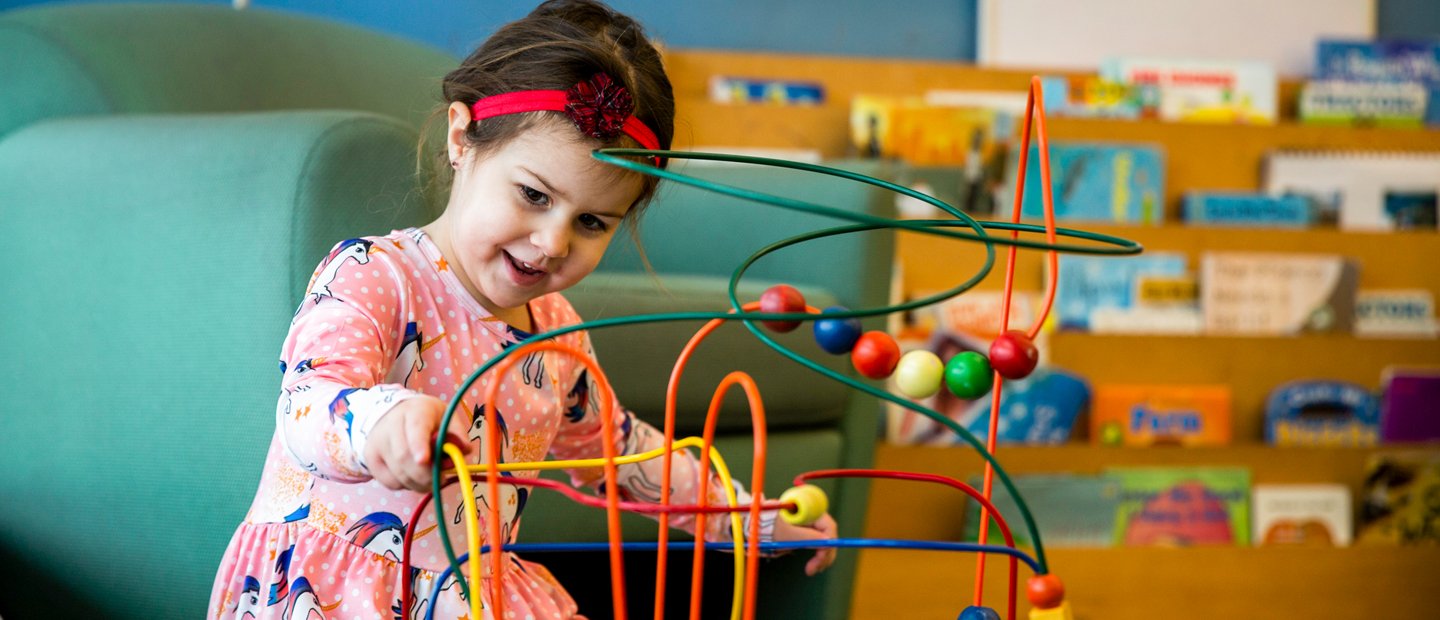
Toddler
The Lowry Toddler Program serves children 18 months through 3 years. The Toddler curriculum emphasizes language experiences and social interactions. Toddlers engage in active learning experiences throughout the daily routine. These experiences are designed to foster development in all areas of development. (See Toddler Key Developmental Indicators)
The Lowry Toddler Program is based on the philosophy that children grow and develop to their fullest potential if given the opportunity to explore, create and problem solve with materials appropriate to their developmental age. The class provides young children with many experiences: puzzles, books, climbers, puppets, riding toys, and housekeeping props.
We also offer children the opportunity to become involved in the preparation of their snacks, introduce art experiences, sing songs and finger plays, and play group games. The program fosters social and emotional development by providing opportunities for adult/child and child/child interactions. Children this age may not “play with” each other until they are close to three years of age, but will benefit from playing “along side” their peers.
Your child’s age and unique personality determine how they will react to the program. Often the younger children and those who are more cautious will observe a while before joining in an activity. An observing child is still learning from the experience.
Group music and story times are held, but participation is optional for the toddlers. Some children are more ready for this experience than others. It is not developmentally appropriate to expect toddlers to sit in a group for story or follow directions in a group music time. Therefore, we provide attractive, stimulating, and developmentally appropriate activities geared to the individual child. Many times snack preparations or a rousing marching band record will spontaneously involve all the children because they are truly interested.
Letter and numbers are used in a casual manner. Children will not be taught rote skills but concepts will be reinforced through daily use and exposure. A good sense of language is fostered through poetry, stories and songs; fine motor skills through puzzles, blocks, water play, art, cooking; and gross motor skills through climbing, marching, dancing, riding and pulling toys.
Toddler Key Developmental Indicators
The Toddler Key Developmental Indicators, developed by the High/Scope Educational Research Foundation are a set of guidelines that frame the content of early learning and development for children 0 – 2 ½ years old. Children are exposed to experiences and activities that promote the following:
Sense of Self
- Expressing initiative
- Distinguishing “me” from others
- Solving problems encountered in exploration and play
- Doing things for themselves
Social Relations
- Forming attachment to a primary caregiver
- Building relationships with other adults
- Building relationships with peers
- Expressing emotions
- Showing empathy toward the feelings and needs of others
- Developing social play
Creative Representation
- Imitating and pretending
- Exploring building and art materials
- Responding to and identifying pictures and photographs
Movement
- Moving parts of the body (head – turning, grasping, kicking, etc.
- Moving the whole body (rolling, crawling, cruising, walking, running, balancing, etc.)
- Moving with objects
- Feeling and expressing steady beat
Music
- Listening to music
- Responding to music
- Exploring and imitating sounds
- Exploring vocal pitch sounds
Communication and Language
- Listening and responding
- Communicating nonverbally
- Participating in communication give-and-take
- Communicating verbally
- Exploring picture books and magazines
- Enjoying stories, rhymes, and songs
Exploring Objects
- Exploring objects with the hands, feet, mouth, eyes, ears, and nose
- Discovering object permanence
- Exploring and noticing how things are the same or different
Early Quantity and Number
- Experiencing “more”
- Experiencing one-to-one correspondence
- Exploring the number of things
Space
- Exploring and noticing location of objects
- Observing people and things from various perspectives
- Filling and emptying, putting in and taking out
- Taking things apart and fitting them together
Time
- Anticipating familiar events
- Noticing the beginning and ending of a time interval
- Experiencing “fast” and “slow”
- Repeating an action to make something happen again, experiencing cause and effect
More detailed information concerning the Toddler Key Developmental Indicators can be found in Tender Care and Early Learning: Supporting Infants and Toddlers in Child Care Settings. Jacalyn Post and Mary Hohmann. (2002). High/Scope Press: Ypsilanti, Michigan.
SEHS - Lowry Center for Early Childhood Education

